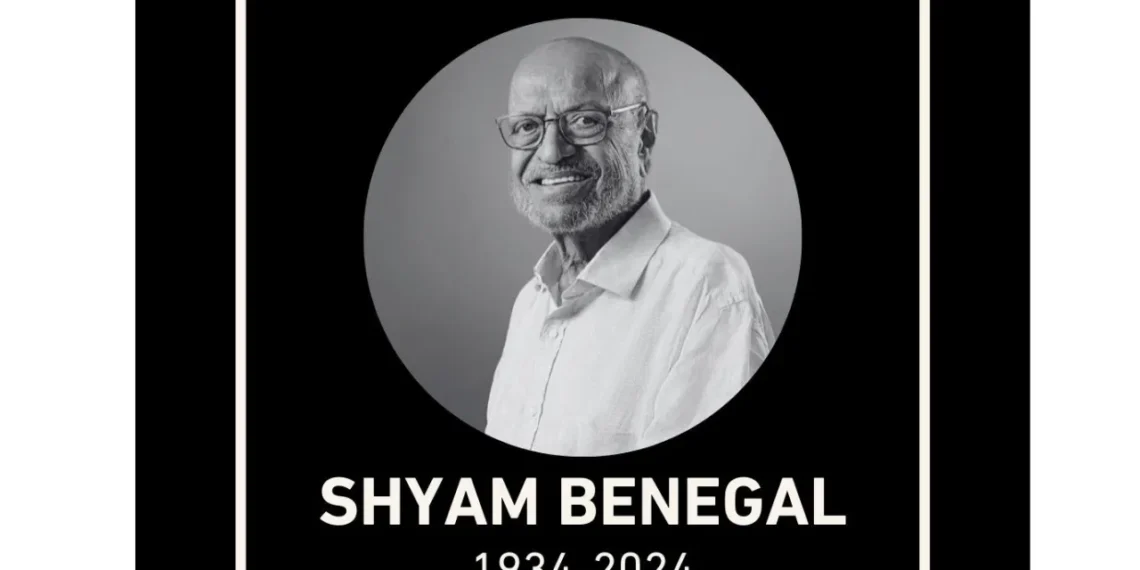Celebrated for his transformative impact on Indian filmmaking, Shyam Benegal’s demise at 90 marks the end of an era. With masterpieces like Bhumika and Zubeidaa, and honors including the Padma Bhushan, his storytelling continues to inspire.
BY PC Bureau
Veteran filmmaker Shyam Benegal, a towering figure in Indian cinema and a pioneer of the parallel cinema movement, passed away on December 23 in Mumbai at the age of 90. Known for his groundbreaking contributions to storytelling and his ability to reflect the complexities of Indian society with realism and depth, Benegal’s death marks the end of an era in Indian filmmaking.
Born on December 14, 1934, in Hyderabad, Benegal was deeply influenced by the socio-political fabric of India, which shaped his vision as a filmmaker. He began his career in advertising but soon ventured into films, where his voice became synonymous with socially conscious cinema.
He created ‘the new wave’ cinema. #shyambenegal will always be remembered as the man that changed the direction of Indian Cinema with films like Ankur, Manthan and countless others. He created stars out great actors like Shabama Azmi and Smita Patil. Farewell my friend and guide pic.twitter.com/5r3rkX48Vx
— Shekhar Kapur (@shekharkapur) December 23, 2024
Benegal’s debut feature film, Ankur (1973), announced the arrival of a new cinematic force. The film, a poignant portrayal of rural India, won national and international acclaim and set the tone for a career dedicated to realism and the exploration of pressing social issues. Over the decades, he directed iconic films such as Nishant (1975), Manthan (1976), Bhumika (1977), Mammo (1994), Sardari Begum (1996), and Zubeidaa (2001), among others. Each film was a testament to his exceptional ability to craft narratives that combined art with social relevance, creating enduring stories that resonated with audiences across generations.
Benegal’s contribution to cinema extended beyond filmmaking. His work inspired a new generation of filmmakers and gave rise to the parallel cinema movement in India, which sought to offer a realistic alternative to the escapism of mainstream Bollywood. His films tackled themes such as gender inequality, caste discrimination, rural oppression, and the struggles of everyday people, often shining a light on the marginalized and voiceless in Indian society.
In recognition of his extraordinary contributions, Shyam Benegal was honored with numerous accolades, including 18 National Film Awards. The Government of India conferred upon him the Padma Shri in 1976 and the Padma Bhushan in 1991, cementing his legacy as one of the most influential filmmakers in the country.
Beyond his films, Benegal was a prolific storyteller across other mediums. He directed acclaimed television series such as Bharat Ek Khoj (1988), an adaptation of Jawaharlal Nehru’s The Discovery of India, which brought India’s history to life for millions of viewers. He also made significant contributions as a writer, mentor, and producer, shaping the narrative of Indian cinema for decades.
Benegal’s storytelling was celebrated for its humanity, nuance, and commitment to truth. His characters, deeply rooted in Indian society, reflected its triumphs, struggles, and contradictions, making his work timeless and universally relevant.
As news of his passing spread, tributes poured in from the film fraternity and beyond. Filmmakers, actors, and admirers remembered him as a visionary, a mentor, and a creator who elevated Indian cinema to global standards.
Shyam Benegal’s legacy will endure in the annals of Indian filmmaking, and his contributions will continue to inspire filmmakers and audiences alike. He leaves behind an indelible mark on the cultural landscape of India, reminding us of the power of cinema to challenge, inspire, and transform society.
Benegal is survived by his family and an unparalleled body of work that will remain a beacon of meaningful cinema. His passing is a profound loss to the world of art and storytelling, but his films and vision will live on, continuing to shape the narrative of Indian cinema for generations to come.












